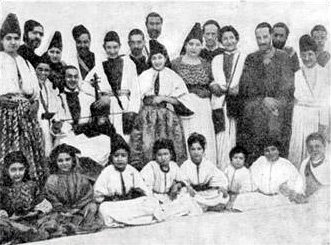
The People of the Land & Things We Shall Do in the Land
The Samaritans trace their descent to the tribes of Ephraim, Manasseh, and Levi, while many Igbo clans, particularly Nri and Aguleri, maintain oral histories that trace their lineage to Gad or Levi; however, Igbo heritage is not limited to these. Both groups consider ancestral identity an integral part of their religious practice.

Exiled from Familiar Lands: Arab Jews & Igbos
Once in exile, particularly in Israel, Arab Jews faced cultural suppression and renaming. They were no longer “Iraqi,” “Tunisian,” or “Yemeni” Jews. They were classified under the imposed label “Mizrahi”—a vague, catch-all term meaning “Eastern” that erased centuries of specific Arab cultural and linguistic heritage.

Pseudo Kings & Palm-Wine Crowns
Instead of one king lording over everyone, we had village assemblies, age grades, and councils of elders.

Scapegoat Pt. 3
When the colonial ships docked on African shores, they didn’t just bring soldiers. They brought mirrors to blind, treaties to deceive, and gold to corrupt. And standing on the shoreline—proud in their regalia—were Africa’s kings and chiefs. Some resisted. Some negotiated. Others opened the gates.

SCAPEGOAT PT.2
Igbos have long been known for their fierce independence and egalitarian principles. Unlike some African societies with centralized monarchies, the Igbo practiced a decentralized, communal governance structure in which the people shared decision-making. This model shaped their social identity and played a critical role in their resistance to enslavement, as they valued autonomy and rejected foreign domination.

It’s Not Voodoo, It’s Not Juju: It's Omenana
Customs surrounding mourning and memorialization are not unique to the Igbo or Judaism but reflect a universal human desire to remember and honor our deceased. By reframing these practices, we dismantle colonial-era narratives and restore respect to deeply spiritual and meaningful traditions.

Hebrews of West Africa
Forced migrations linked African Hebrew traditions with new cultural forms in the Americas. The resilience of these communities in preserving their heritage amidst displacement is a testament to their enduring identity.

The Most Successful Egalitarian Society to Exist
The ancient Igbo society stands as a beacon of egalitarianism, where men and women coexisted as equals, each contributing uniquely to their community’s success. Through shared responsibilities, leadership opportunities, and mutual respect, they created a society that thrived without gender-based conflict.
